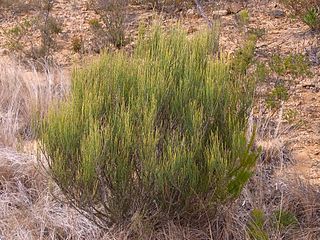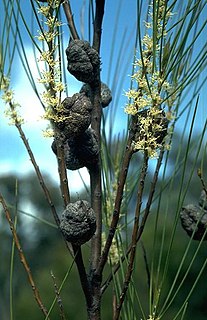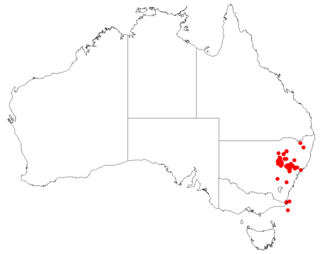
Goobang is a national park located in New South Wales, Australia, 296 kilometres (184 mi) northwest of Sydney. It protects the largest remnant forest and woodland in the central west region of the state, where interior and coastal New South Wales flora and fauna species overlap. Originally named Herveys Range by John Oxley in 1817, the area was reserved in 1897 as state forest because of its importance as a timber resource, and was designated a national park in 1995.

Allocasuarina is a genus of trees in the flowering plant family Casuarinaceae. They are endemic to Australia, occurring primarily in the south. Like the closely related genus Casuarina, they are commonly called sheoaks or she-oaks.

Casuarina is a genus of 17 tree species in the family Casuarinaceae, native to Australia, the Indian subcontinent, southeast Asia, islands of the western Pacific Ocean, and eastern Africa. It was once treated as the sole genus in the family, but has been split into four genera.

Allocasuarina torulosa, the rose she-oak or forest oak, is a tree which grows in sub-rainforest of Queensland and New South Wales, Australia. Originally described as Casuarina torulosa by William Aiton, it was moved to its current genus in 1982 by Australian botanist Lawrie Johnson. It is the type species of the genus Allocasuarina.

Allocasuarina distyla, commonly known as scrub she-oak, is a shrub or small tree of the She-oak family Casuarinaceae endemic to New South Wales.

Allocasuarina luehmannii is a species of ironwood tree native to Australia and its wood is the hardest commercially available.

Allocasuarina verticillata, commonly known as drooping she-oak or drooping sheoak, is a nitrogen fixing native tree of southeastern Australia.

The Kings Tableland is a plateau, located in the Blue Mountains in Wollondilly Shire, New South Wales, Australia. The ridge is an eroded remnant of a sandstone layer that is approximately 1,000 metres (3,300 ft) AMSL, situated immediately south of Wentworth Falls. The Tableland is the major southerly spur of the main spine of the Blue Mountains Range and forms the beginning of the Southern Escarpment, an unbroken series of tall sandstone cliffs which fringes the Jamison, Megalong, Kanimbla and Hartley Valleys.

Allocasuarina littoralis, commonly known as black sheoak, black she-oak, or river black-oak, is an endemic medium-sized Australian tree. A. littoralis is named for its growth near the coast; this is somewhat misleading, as it will grow well both inland and in coastal zones.

Allocasuarina portuensis, commonly known as the Nielsen Park she-oak, is an extremely rare plant growing in Sydney, Australia. Encountered as a shrub or small slender tree, up to 5 metres tall, it has green drooping branchlets up to 27 cm (10.5 in) in length. It is dioecious, that is, male and female flowers are borne on separate plants. Measuring 1.2–1.5 cm (0.47–0.59 in) long and 0.8–1 cm wide, the cones are perched on 0.2–1.5 cm long peduncles arising from the branchlets.

Allocasuarina nana, commonly known as the dwarf she-oak, is a small plant found in eastern Australia. Often seen around one metre tall, it grows in exposed heathlands, ridges, clifftops on sandstone based soils. It is found on the coast and tablelands, south of the Cudgegong River near Mudgee.

Allocasuarina inophloia, also known as woolly oak, or stringybark she-oak, is a shrub or small tree of the she-oak family Casuarinaceae endemic to inland New South Wales and Queensland. The hairy bark is an unusual feature.

Hakea dohertyi, commonly known as the Kowmung hakea, is a shrub endemic to a restricted locale in the Great Dividing Range in central New South Wales in Australia.

Allocasuarina paludosa, commonly known as the swamp sheoak or scrub sheoak, is a woody shrub of the family Casuarinaceae. It is endemic to south-eastern Australia.

Allocasuarina diminuta, commonly known as the broombush sheoak, is a shrub of the genus Allocasuarina native to an area in eastern New South Wales.

Allocasuarina glareicola is a species of the genus Allocasuarina native to Australia.

Allocasuarina gymnanthera, commonly known as the mallee sheoak, is a species of Allocasuarina genera native to Australia.

Allocasuarina rigida is a species of the genus Allocasuarina native to Australia.

Allocasuarina rupicola, commonly known as shrubby she-oak, is a species of the genus Allocasuarina native to Australia.

Allocasuarina thalassoscopica is a species of Allocasuarina native to Australia.





















